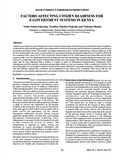| dc.description.abstract | Electronic government (e-government) provides a common infrastructure and direction across the public sector. It enhances collaboration within and among public sector organizations between Government and the business community, and between
government and their citizens. Successful e-government depends on how well the targeted users (citizens) make use of the services. Kenya ranks very lowly on citizen usage of e-government systems, having been ranked by a UN report in 2010 with
an e-readiness index value of 0.33. This is below the world average of 0.42, which makes Kenya better than only 60 other countries in the world. To implement and utilize modern and innovative technology, it requires that the government as well as
citizens be e-ready, hence the need to evaluate their readiness for e-governance. Several research findings reveal that a high index may be only indicating that a country is e-ready in terms of Information Communication Technology (ICT) infrastructure and info-structure, institutions among others which is a very poor measure of the e-readiness of citizens. The aim of this paper is to investigate e-readiness factors in the context of Kenya's e-government systems. A desktop survey was used and findings indicate that e-readiness can be hampered if the users are not considered. This means that for any
government to successfully implement any e-government initiative, the citizen should be well prepared to use the systems. | en_US |

